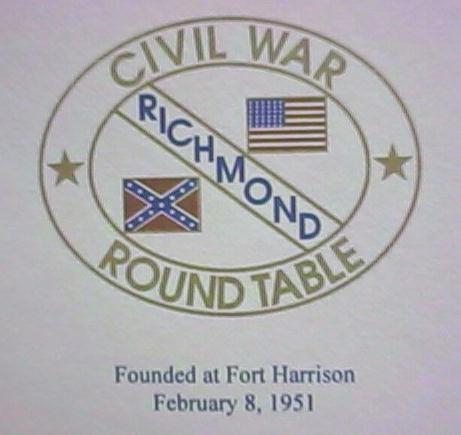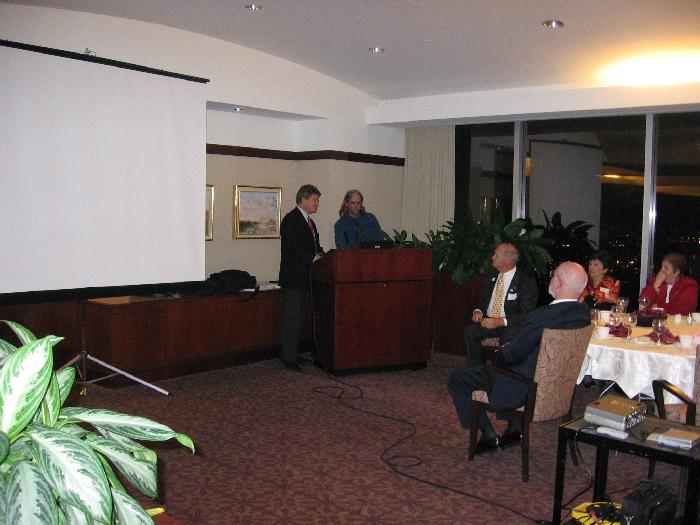


December 2005
rcwrt.org
Richard Forrester, President Rob Monroe, Editor 8008 Spottswood Road 2416 Edenbrook Dr. Richmond, VA 23229 Richmond, VA 23228-3040 dforrester@verizon.net RMonroe500@comcast.net
December 2005 PROGRAM Mr. James H. Blankenship, Jr. "The United States Military Railroad at City Point" 8:00 p.m., Tuesday, December 13, 2005, at the Boulevard United Methodist Church, 321 N. Boulevard, Richmond, VA (corner of Boulevard and Stuart Ave.) Enter the basement door on the right side under the front steps. James Blankenship, a native of Dinwiddie County, is a historian at Petersburg National Battlefield. It is here where he began his 25-year career with the National Park Service as a seasonal ranger manning the horses of a 12-pounder Napoleon artillery crew. Mr. Blankenship served a two-year internship at the Museum of the Confederacy while obtaining his history degree from VCU in 1978. In 1984, Mr. Blankenship returned to Petersburg National Battlefield where he is now preparing for his position as the museum curator. He is an expert on the Siege of Petersburg, the history of City Point, and black-powder artillery. Mr. Blankenship resides in the historic City Point district of Hopewell, Va. He is the author of "As Smooth As A Greased Wheel", a detailed study of the US Military Railroad at City Point (scheduled release 2006). On June 18, 1864 General Grant ordered the creation of a forward supply base capable of supporting the 125,000 men and 65,000 horses & mules of the Union armies around Petersburg. The resulting port facilities and supply depot at City Point were unparalleled in prior military history. The U.S. Military Railroad Construction Corps built the majority of the 280 support buildings and lay over 21 miles of railroad track to the battlefront. They maintained the 25 locomotives and 275 rolling stock, while logging over 2.3 million miles. General Grant praised the operations at City Point stating, "There has been no army in the United States where the duties of Quartermaster have been so well performed." Grant fully understood the importance of logistical support in winning a military campaign and at Petersburg victory rode the rails.
Summary of November Meeting
The Richmond Civil War Round Table held its annual dinner last month, high above Richmond on the 24th floor of the SunTrust building downtown. In addition to a spectacular view of the city and a superb meal, Jeff Johnston of the National Oceanic and Atmospheric Administration (NOAA) treated Round Table members to an engrossing presentation. Johnston has worked with NOAA's Monitor National Marine Sanctuary and gave RCWRT members an inside look at the recovery and restoration of the legendary Union ironclad. The Monitor was the brainchild of Swedish-American inventor John Ericsson. Johnston described Ericsson as a self-confident genius, a man who always claimed to be right and generally was. In 1861 Ericsson designed a ship whose hull and cannon worked together. Union officials gave him a contract that allowed only 90 days for the ship's construction. It took Ericsson 108 days to complete but only because he had to wait for materials. The Monitor's firepower came from two 11-inch Dahlgren guns and the ironclad boasted the first rotating turret in naval history. It was an imposing sight, five feet tall with a 20-foot diameter, but for the twenty men working inside the turret, space was quite cramped. It was the Monitor's March 9, 1862 clash with the Confederate ironclad Merrimac that made both ships famous. Overnight, all other navies across the world became obsolete. The ironclad was to meet its demise in the wee hours of December 31, 1862 off the coast of Cape Hatteras, NC. It was not Confederate gunfire but a gale and 20-foot seas that eventually sank her. Remarkably, only 16 men perished out of the 62 on board. Normally a much larger crew would have been manning the ship but many were home on leave for the holidays. The 46 survivors were rescued through the heroic efforts of the U.S.S. Rhode Island. The Medal of Honor was awarded to the Rhode Island's crew for their bravery that cold December night. In 1973 the ironclad was found upside down, supported by its famed turret, on the floor of the Atlantic. It had hit bottom stern first. Among the artifacts, the remains of two unidentified soldiers were discovered. In 1987 NOAA selected the Mariner's Museum in Newport News as the principal repository. Undoubtedly the biggest challenge the crew faced was recovering the ship's famed turret. First the twin Dahlgren guns had to be removed from their carriages. Eventually, through the work of 147 Navy divers, the turret was rescued intact. The recovered turret is a great place to work, joked Johnston, if you can get used to the smell of 115-year-old sushi. Among the smaller items rescued are 27 pieces of silverware, four of them engraved with officers' names. Other recovered items include a sledgehammer head, hair combs, a pocketknife, lantern mounts, a hydrometer (intact with paper), a wedding band and a bottle of hair restoration ointment. This last item may have been used to smuggle alcohol on board, Johnston added. It was financially impossible to recover the Monitor intact, Johnston explained. Recovery work is expensive and there is never enough money. There are many, many more items at the wreck site, Johnston noted, but no plans to recover them at this time due to the lack of available funding.
General Assembly Recommends State Support of Museum of the Confederacy At the end of the fourth and final meeting of the Virginia General Assembly joint subcommittee on The Museum of the Confederacy, legislators voted to adopt in large part the findings and recommendations proposed by Del. William Janis. Janis handed a draft document to his fellow legislators with these findings of fact: "...The ongoing construction and encroachment of MCV Hospital have created significant obstacles to tourists, visitors and patrons who wish to find the Museum. These traffic and parking problems, as well as the noisy and chaotic setting, have only exacerbated the trend of declining numbers of visitors of the Museum, creating a real financial crisis for the annual operating budget." "...These problems are in some measure of the Commonwealth's making.While MCV and VCU have provided some financial relief to the Museum to offset the impact of construction, it has been insufficient to reverse the trend in visitors, and the resulting financial strain." "If this financial strain on the Museum continues, the Trustees may find themselves forced to take measures that are equally drastic and unpalatable, such as selling some artifacts." "We can and should, as the stewards of the taxpayers' purse, be very skeptical about requests for public financing of non-state agencies. But we should also acknowledge those circumstances when it is only fair and equitable to alleviate the damage done by state action. The Subcommittee believes this is precisely such a case, and that fairness requires, at a minimum, a modest, and temporary, state subsidy.because it has been the Commonwealth, through its agents the Medical College of Virginia and VCU, that has at least exacerbated the current crisis, if not caused it outright." "All members share an absolute commitment to take whatever steps within our power to safeguard and preserve this historic treasure, even if it remains in its current location." The subcommittee recommended that the Chairman of House Appropriations and the Chairman of the Senate Finance Committee identify sufficient funds for the museum to offset the impact of VCU's construction. No recommendation was made regarding the possible relocation of the White House of the Confederacy. "We were pleased with the state's findings and recommendations," said Museum of the Confederacy Executive Director Waite Rawls in a statement posted on the museum's website. "The state's recommendations leave us with a sense of hope; and the prospect of state support for the museum is good news. But we still have a long way to go and a lot of work to do."
Odds and Ends You may have noticed a change in our speaker for this month. David Blight was originally scheduled to speak at the RCWRT's December meeting. Unfortunately Mr. Blight fell and injured his neck and had to postpone his presentation. We hope to reschedule Mr. Blight in the near future. James Blankenship was scheduled to speak at our January meeting but has graciously consented to come this month instead. The Round Table wishes to thank Mr. Blankenship for being flexible with his schedule. Kudos also to Bernie Fisher and Shep Parsons for their quick work in lining up a speaker on just a few days' notice.
At our December meeting we will be drawing a winner in our raffle of a complete 28-volume set of Time Life's Civil War books series. Longtime member Joe Monroe generously donated these books to the Round Table. Before Tuesday's meeting you will have one last opportunity to purchase tickets for the drawing. This same handsome set of books sold for well over $200 on Ebay this past weekend.
Looking for a unique gift for yourself or a Civil War buff on your Christmas list? Pamplin Park and the National Museum of the Civil War Soldier is offering a Civil War Adventure Camp. Participants travel back in time and become a private in the Army, select Confederate or Union uniforms, sleep in recreated huts or barracks, enjoy authentic Civil War-era hot meals, and fire a replica rifle. Participants will hear period ghost stories around the fire, protect their platoons on guard duty, and take part in 19th century medical and signal corps programs. The Civil War Adventure Camp experience is geared to adults and children eight and above. Advance reservations are required to participate in this one-of-a-kind adventure. For more information, see the park's website, www.pamplinpark.org or call 1-877-PAMPLIN.
You can receive your newsletter sooner and help the Richmond Civil War Round Table save money by signing up to receive your newsletter via email. To add your name to the list, simply email the editor at RMonroe500@comcast.net Thanks!
Richmond Civil War Round Table Newsletter Rob Monroe, Editor 2416 Edenbrook Dr. Richmond, VA 23228-3040
Return to News Letters Index
Return to main page

©R.C.W.R.T. 2005